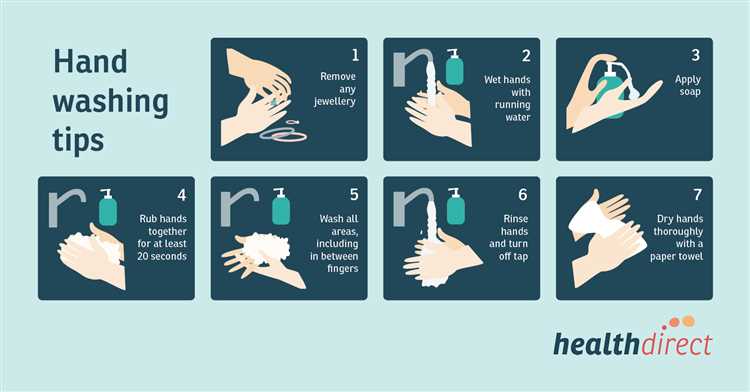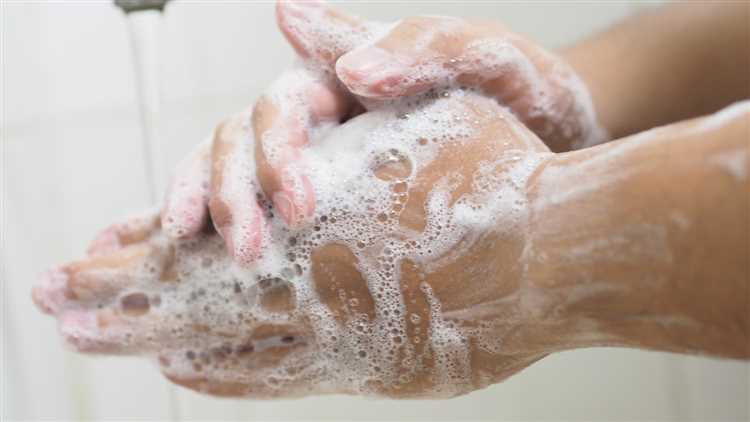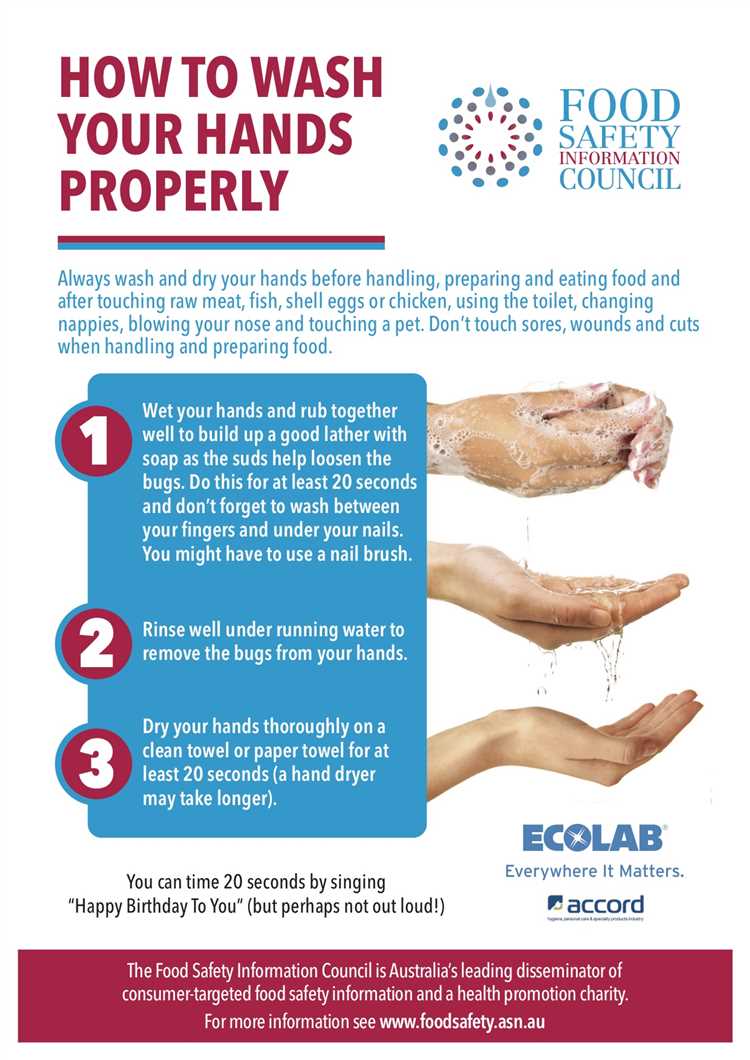
In today’s world, where hygiene and cleanliness are paramount, it is baffling to think that there are still individuals who do not prioritize washing their hands. Despite the numerous health campaigns and educational efforts, there remains a subset of people who disregard this basic hygiene practice.
These individuals exhibit a disregard for the well-being of not only themselves but also those around them. By neglecting to wash their hands, they increase the risk of spreading harmful bacteria and viruses, contributing to the overall deterioration of public health.
There are several reasons why these individuals may fail to wash their hands regularly. Some may view handwashing as a tedious task, believing that it is unnecessary or ineffective. Others may simply lack awareness about the importance of hand hygiene or have misconceptions about the effectiveness of soap and water.
Furthermore, cultural and socio-economic factors can also play a role. In some cultures, handwashing may not be considered a priority or may not be ingrained as a social norm. Additionally, individuals from disadvantaged backgrounds may not have access to proper handwashing facilities or even clean water, making it difficult for them to practice good hand hygiene.
It is crucial that we address this issue and educate individuals about the importance of handwashing. By promoting hygiene practices and providing accessible resources, we can help create healthier communities and combat the spread of diseases.
- The Low Handwashers
- The Alarming Statistics
- 1. Low Handwashing Rates
- 2. Increased Risk of Illness
- The Impact on Public Health
- The Most Common Excuses
- The Dangers of Poor Hand Hygiene
- Ways to Promote Handwashing
- The Importance of Personal Responsibility
- The Impact of Personal Negligence
- Taking Action and Encouraging Change
- Q&A
- Why is handwashing important?
- What are the consequences of not washing hands?
- What percentage of people do not wash their hands regularly?
- Why do some people not wash their hands?
- What are some tips for effective handwashing?
- Why is it important to wash our hands?
- Who are the individuals who wash their hands the least?
The Low Handwashers
When it comes to hand hygiene, there are unfortunately individuals who do not prioritize washing their hands. This lack of handwashing can have serious consequences for both individual health and public health as a whole.
Studies have shown that the individuals who wash their hands the least often are more likely to spread germs and come into contact with infectious diseases. This can lead to outbreaks of illnesses such as the common cold, influenza, and even more serious conditions like respiratory infections.
There are several factors that contribute to this behavior. Some individuals may simply be unaware of the importance of handwashing and how it can prevent the spread of diseases. Others may have misconceptions about hygiene or lack access to proper handwashing facilities.
Education plays a crucial role in addressing this issue. By increasing public awareness about the importance of hand hygiene, we can encourage more individuals to adopt regular handwashing habits. Schools, workplaces, and healthcare facilities can also play a role by implementing hand hygiene programs and providing easy access to hand sanitizers and soap.
It is important for everyone to understand that handwashing is a simple yet effective way to prevent the spread of germs and protect both individual and public health. By making handwashing a priority, we can all contribute to creating a healthier and safer environment for ourselves and those around us.
The Alarming Statistics
When it comes to personal hygiene, there is an alarming number of individuals who neglect the importance of handwashing. These statistics highlight the need for improved awareness and education on proper hand hygiene.
1. Low Handwashing Rates

According to recent studies, a significant portion of the population fails to wash their hands regularly. Shockingly, only around 40% of people wash their hands after using the bathroom, while less than 20% wash their hands before handling food.
2. Increased Risk of Illness
The lack of hand hygiene has serious consequences on public health. It is estimated that dirty hands are responsible for spreading around 80% of common infectious diseases, including the flu and colds. This puts individuals and communities at a higher risk of illness and outbreaks.
These statistics underscore the pressing need for widespread education on the importance of handwashing. By improving hand hygiene practices, we can significantly reduce the spread of germs and promote a healthier society.
The Impact on Public Health

Poor hand hygiene practices can have a significant impact on public health. When individuals neglect to wash their hands regularly, it increases the risk of spreading germs and infection. This can lead to outbreaks of contagious diseases, such as the common cold, influenza, or even more severe illnesses like COVID-19.
Without proper handwashing, bacteria and viruses can easily spread from person to person. This is especially true in high-traffic areas such as schools, workplaces, and public transportation. Even a simple handshake or touching contaminated surfaces can transfer germs, which can then be unknowingly ingested when a person touches their face or eats without washing their hands.
According to the World Health Organization (WHO), hand hygiene is one of the most effective ways to prevent the spread of infectious diseases. It is estimated that regular handwashing with soap and water can reduce the risk of respiratory infections by up to 16%. It is a simple and cost-effective measure that can significantly improve public health outcomes.
In addition to reducing the transmission of diseases, proper hand hygiene also plays a crucial role in controlling antibiotic resistance. When individuals do not wash their hands before handling food or after using the restroom, they can easily spread harmful bacteria that are resistant to antibiotics. This can lead to infections that are difficult to treat and can have serious consequences for public health.
Public health campaigns and education about the importance of hand hygiene are essential to improve overall hygiene practices. By raising awareness about the impact of poor hand hygiene and promoting regular handwashing, communities can work together to reduce the spread of infectious diseases and protect public health.
The Most Common Excuses
When it comes to not washing hands, people often come up with various excuses to justify their behavior. Here are some of the most common excuses:
1. “I’m too busy”: Many individuals claim that they are too busy to wash their hands properly. Whether it is because of work, household chores, or other responsibilities, they prioritize other tasks over maintaining proper hand hygiene.
2. “It doesn’t make a difference”: Some people believe that washing their hands doesn’t really make a difference in preventing the spread of germs and diseases. They underestimate the importance of good hand hygiene and fail to realize the potential consequences of their actions.
3. “I don’t like the feeling”: There are those who simply dislike the sensation of wet or dry hands after washing them. They find the experience unpleasant and therefore avoid washing their hands as frequently as they should.
4. “I never get sick”: Individuals who rarely fall ill may use this as an excuse to neglect proper hand hygiene. They believe that since they rarely experience any health issues, they don’t need to worry about washing their hands regularly.
5. “I’m immune”: Similar to the previous excuse, some people think that they are immune to germs and diseases. They have a false sense of invincibility and think that hand hygiene practices don’t apply to them.
6. “There’s no soap or water available”: In certain situations, individuals may genuinely not have access to soap and water, which makes it difficult for them to wash their hands. However, this excuse should be used sparingly, as most people have access to basic hand hygiene facilities in their daily lives.
7. “I forget”: Forgetfulness is another common excuse. Some individuals simply forget to wash their hands or don’t make it a priority in their daily routine. This excuse highlights the need for better awareness and mindfulness regarding hand hygiene practices.
It is essential to address and debunk these excuses, as they contribute to the spread of germs and increase the risk of infections. Everyone should understand the importance of proper hand hygiene and make it a priority in their daily lives.
The Dangers of Poor Hand Hygiene
Poor hand hygiene can have serious consequences for both the individual and the community as a whole. When people do not wash their hands regularly and properly, they increase the risk of spreading harmful bacteria and viruses. This can lead to the transmission of diseases such as the common cold, flu, and stomach infections.
One of the biggest dangers of poor hand hygiene is the potential for outbreaks of foodborne illnesses. When people do not wash their hands before handling food, bacteria and other contaminants can be transferred to the food. This can result in food poisoning, which can cause symptoms such as diarrhea, vomiting, and abdominal pain. In severe cases, foodborne illnesses can even be life-threatening.
Poor hand hygiene also plays a significant role in the spread of healthcare-associated infections (HAIs) in hospitals and other healthcare settings. Healthcare workers who do not practice proper hand hygiene can inadvertently spread bacteria and viruses from patient to patient. This can lead to infections such as pneumonia, urinary tract infections, and surgical site infections.
In addition to the physical health risks, poor hand hygiene can also have negative social and economic consequences. Outbreaks of infectious diseases can result in increased healthcare costs, lost productivity, and missed school or work days. Furthermore, the stigma associated with poor hand hygiene can lead to social isolation and discrimination.
It is important for individuals to recognize the dangers of poor hand hygiene and to take simple steps to protect themselves and others. Encouraging regular handwashing with soap and water, especially before eating, after using the restroom, and after coughing or sneezing, can go a long way in preventing the spread of infectious diseases. Using hand sanitizers when soap and water are not available is also an effective alternative.
By practicing good hand hygiene, individuals can not only protect themselves from illness but also contribute to the overall health and well-being of their communities.
Ways to Promote Handwashing
To encourage handwashing and reduce the number of individuals who wash their hands the least, the following strategies can be implemented:
- Public Awareness Campaigns: Launching campaigns to educate the public about the importance of handwashing and its role in preventing the spread of diseases. This can include advertisements, posters, and social media campaigns.
- Education in Schools: Incorporating hand hygiene education into the school curriculum, teaching children proper handwashing techniques and the importance of washing their hands regularly.
- Workplace Initiatives: Implementing hand hygiene policies in workplaces, providing hand hygiene facilities such as hand sanitizers and wash stations, and promoting regular handwashing breaks.
- Community Engagement: Working with community leaders, organizations, and influencers to spread awareness about handwashing and its benefits. This can involve organizing community events, workshops, and demonstrations.
- Handwashing Stations: Installing handwashing stations in public areas such as parks, markets, and transportation hubs to make handwashing easily accessible to everyone.
- Role Models: Encouraging public figures, celebrities, and influential individuals to promote handwashing through endorsements and personal hygiene practices.
- Peer Influence: Utilizing peer pressure and social norms to encourage handwashing. This can be achieved through social campaigns highlighting the positive behavior of individuals who practice regular handwashing.
- Incentives and Rewards: Introducing incentives or rewards for individuals who consistently practice good hand hygiene, such as recognition programs or small rewards for children.
- Parental Involvement: Educating parents on the importance of handwashing and encouraging them to instill hand hygiene habits in their children from an early age.
By implementing these strategies, it is possible to raise awareness about handwashing and promote regular hand hygiene practices, ultimately reducing the number of individuals who wash their hands the least.
The Importance of Personal Responsibility
Personal responsibility plays a crucial role in maintaining the overall well-being and health of individuals. It refers to the understanding that one’s actions have consequences and taking ownership of those actions. When it comes to hygiene practices, such as proper handwashing, personal responsibility becomes even more critical.
Proper handwashing is one of the most effective ways to prevent the spread of germs and diseases. By washing our hands regularly, we can significantly reduce the risk of getting sick and transmitting illnesses to others. However, the responsibility to practice good hand hygiene lies with every individual.
The Impact of Personal Negligence
Unfortunately, there are individuals who neglect their personal responsibility when it comes to handwashing. They may prioritize convenience over health or simply lack awareness about the importance of proper hand hygiene. As a result, they not only put themselves at risk but also endanger those around them.
These individuals may unknowingly spread harmful germs and bacteria when they touch surfaces or interact with others without washing their hands. This behavior can lead to the rapid transmission of diseases, especially in settings such as schools, workplaces, and public places.
Taking Action and Encouraging Change
It is essential for everyone to understand the impact of their actions and take personal responsibility for their hand hygiene habits. By practicing good handwashing techniques, such as using soap and water for at least 20 seconds, individuals can significantly reduce the risk of getting sick and protect themselves and others from harmful infections.
Educational campaigns and awareness initiatives can also play a vital role in promoting personal responsibility for hand hygiene. By educating people about the importance of proper handwashing and its positive impact on overall health, we can encourage individuals to make responsible choices.
| Benefits of Personal Responsibility in Hand Hygiene | Consequences of Neglecting Personal Responsibility |
|---|---|
| Reduces the risk of spreading germs and diseases | Increased risk of getting sick |
| Protects oneself and others from infections | Endangers the health of those around |
| Creates a healthier and safer environment | Rapid transmission of diseases in public settings |
It is important for individuals to recognize their role in maintaining good hand hygiene and take personal responsibility for their actions. By practicing regular handwashing and spreading awareness about its significance, we can collectively contribute to a healthier and safer society.
Q&A
Why is handwashing important?
Handwashing is important because it helps prevent the spread of germs and reduces the risk of getting sick. It is a simple and effective way to protect oneself and others from infections.
What are the consequences of not washing hands?
Not washing hands can lead to the spread of germs and bacteria, which can cause various illnesses such as colds, flu, diarrhea, and food poisoning. It can also contribute to the spread of antibiotic-resistant bacteria.
What percentage of people do not wash their hands regularly?
According to a study, approximately 5-10% of people do not wash their hands regularly or do not wash their hands effectively. This means that a significant portion of the population may not be practicing proper hand hygiene.
Why do some people not wash their hands?
There can be several reasons why some people do not wash their hands. These reasons can include forgetfulness, lack of awareness about the importance of handwashing, cultural or religious beliefs, inconvenience, or laziness. It is important to educate and promote the importance of handwashing to encourage more people to practice proper hand hygiene.
What are some tips for effective handwashing?
Some tips for effective handwashing include using soap and water, rubbing hands together for at least 20 seconds, making sure to wash all parts of the hands including between the fingers and under the nails, and drying hands thoroughly with a clean towel or air dryer. It is also important to wash hands before and after certain activities such as preparing food, using the bathroom, and caring for someone who is sick.
Why is it important to wash our hands?
Washing our hands is important because it helps prevent the spread of germs and bacteria. It can reduce the risk of getting sick and also prevent us from spreading illnesses to others.
Who are the individuals who wash their hands the least?
The individuals who wash their hands the least are often those who are unaware of the importance of hand hygiene or who neglect this practice due to laziness or lack of knowledge. Some individuals may also not have access to proper hand washing facilities or adequate resources to maintain good hygiene.